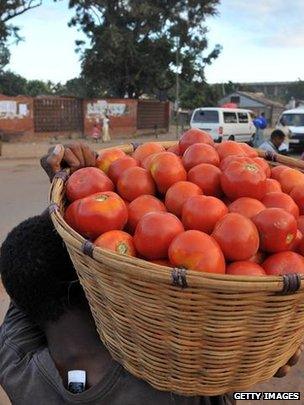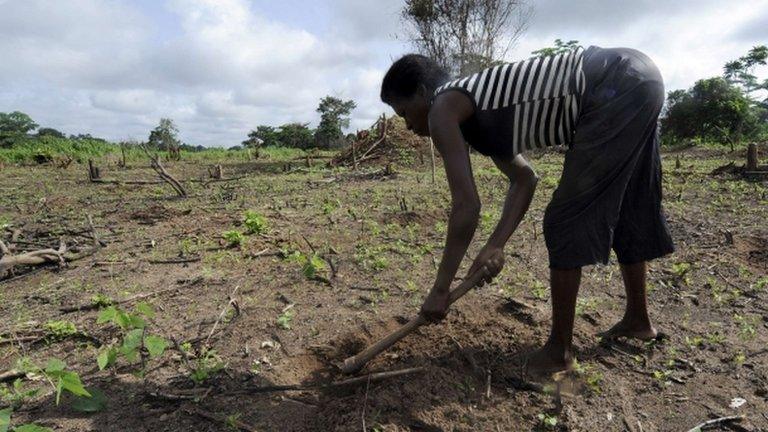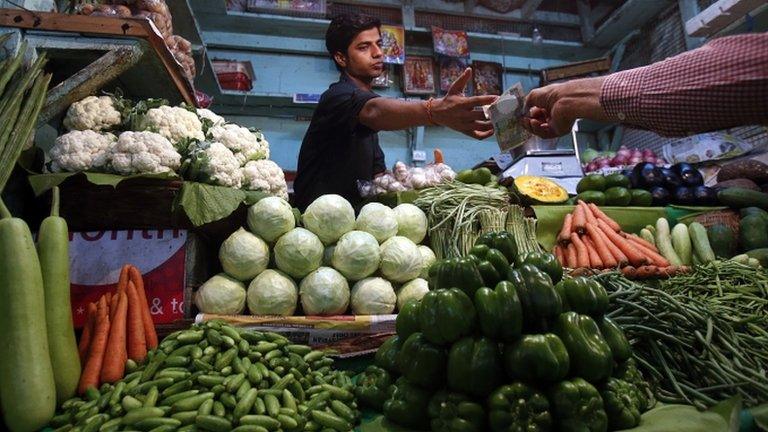Green revolution meeting considers Africa's food future
- Published

The majority of sub-Saharan Africa's food is produced by small-scale farmers
African ministers and business leaders have gathered in Ethiopia to consider ways to trigger a green revolution and improve the continent's food security.
The African Green Revolution Forum, being held in Addis Ababa, will focus on delivering agriculture-led economic growth in sub-Saharan Africa.
In June, the Africa Union issued a declaration to double food productivity and halve poverty by 2025.
Almost 1,000 delegates are expected to attend the four-day meeting.
"I am proud that many African nations are becoming economic powerhouses, but without a viable agricultural sector and a strong rural economy, there cannot be a viable future for Africa," warned International Fund for Agricultural Development (IFAD) president Kanayo Nwanze.
"Scaling up productivity in African agriculture so that it contributes to the prosperity of the women and men living in rural areas is an absolute prerequisite of prosperity for our continent."
Figures show that 200 million Africans are chronically malnourished and five million people die each year as a result of hunger.
It was against this stark backdrop that heads of state and government attending the 23rd African Union Summit adopted the Malabo Declaration, external, which included a call for a greater effort to accelerate agricultural growth.
Africa's backbone
"Africa's smallholder farmers produce the vast majority of food grown on the continent and they are the backbone of a sector that employs more than 65% of all Africans," observed Alliance for a Green Revolution in Africa (AGRA) chairman Strive Masiyiwa.
"So when businesses, governments, researchers and farmers work together to strengthen our food production and distribution systems, they are seeking commercial success that will be shared across African society - and particularly for the poorest among us."
It was a view echoed in a recent report by the UK-based international affairs think-tank Chatham House, external, which concluded that increasing agricultural productivity and adapting farming to climate change were central to Africa's development prospects.
The report's authors said a key challenge was to attract funding for biotechnology projects on staple crops, such as cassava, which were often ignored by commercial funders because they had a limited market, the authors suggested.
They added that there were opportunities to boost yields and increase resilience by improving existing crop varieties, and that "in some cases, biotechnology, and in particular genetic modification (GM), offers advantages over conventional plant-breeding approaches", such as drought, pest and disease resistance.
As well as focusing on the wider issues of productivity and poverty reduction, the Forum will also discuss a number of specific topics, such as reducing post-harvest losses and climate-resilient farming.
On Tuesday, a report looking at the impact of climate change on the continent's small-scale farmers is expected to be presented to the meeting.
- Published25 July 2014

- Published3 March 2014

- Published4 October 2013

- Published11 October 2012
